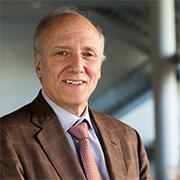
Bruce Miller, MD
Bruce L. Miller, MD, holds the A.W. and Mary Margaret Clausen Distinguished Professorship in Neurology at the University of California, San Francisco, directs the UCSF Memory and Aging Center and is a director of the Global Brain Health Institute. He is the principal investigator of the NIH-sponsored Alzheimer’s Disease Research Center and program project grant on frontotemporal dementia. In addition, he helps lead the Tau Consortium and the Bluefield Foundation, precision medicine collaborations focused on developing treatments for tauopathies and progranulin-mediated forms of frontotemporal dementia.
Miller is a behavioral neurologist who studies the underlying mechanisms of neurocognitive disorders and is a world-renowned expert in the diagnosis and management of dementia. Until recently, most cases of dementia were classified as Alzheimer’s disease with little awareness of the importance of non-Alzheimer dementias. Miller’s description of changes in behavior, language and emotion in the setting of aging have improved the separation of various neurodegenerative diseases from one another, in particular, Alzheimer’s disease from frontotemporal dementia. To support people after diagnosis, Miller has pioneered groundbreaking changes in the provision of care coordination for patients with dementia and their caregivers. His ongoing work includes overseeing a healthy aging study and an artist-in-residence program, both of which emphasize positive aspects of aging.
Miller has been featured in Fortune Magazine, the New York Times, 60 Minutes, the Charlie Rose Show and the PBS Newshour. He has authored more than 800 publications and written several books: The Human Frontal Lobes, The Behavioral Neurology of Dementia and Frontotemporal Dementia. He has received many awards including the Potamkin Award from the American Academy of Neurology, the Elliot Royer Award from the San Francisco Neurological community, the UCSF Academic Senate Distinction in Mentoring Award and the Robert A. Fishman Award and Lecture. In 2016, Miller was elected to the National Academy of Medicine.
Miller’s extensive knowledge in clinical diagnosis, disease pathology and brain-behavior relationships make him a widely sought-after teacher and mentor. He founded the Behavioral Neurology Fellowship at UCSF, oversees visits of more than 50 foreign scholars every year, and co-directs the Global Brain Health Institute, a training program for global leaders in brain health to reduce the scale and impact of dementia around the world. These international collaborations have fostered the development of new prevention and therapeutic approaches and have pushed researchers worldwide toward a more precise understanding of frontotemporal dementia and other neurodegenerative diseases.
